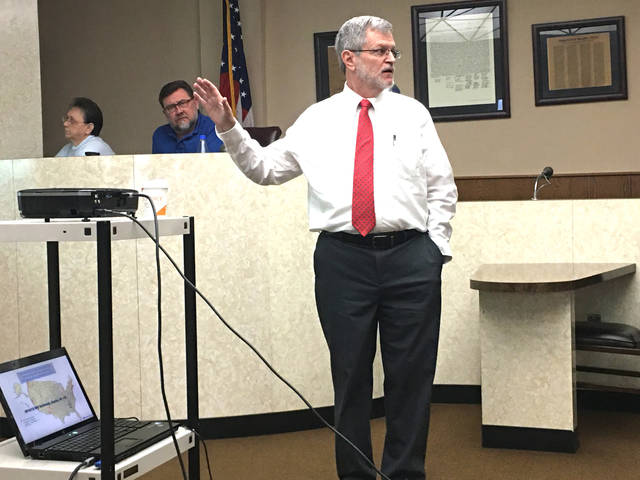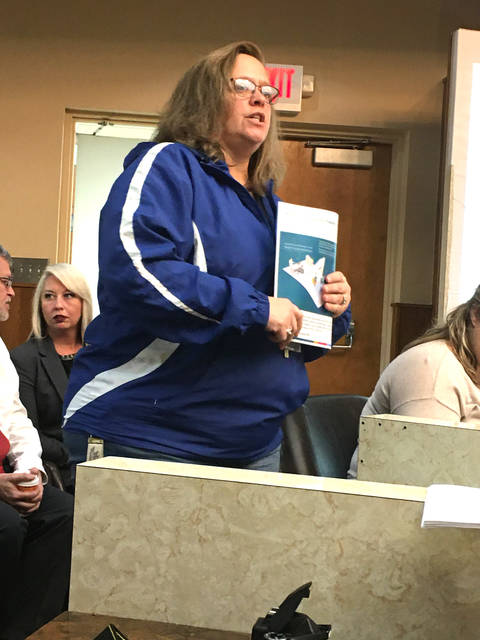Needle exchange program met with skepticism
Published 7:11 pm Tuesday, December 10, 2019
A presentation by Greg Corby Lee regarding a needle exchange program in Bell County was met with skepticism during Tuesday’s fiscal court meeting. The main concern for the Bell County Fiscal Court is the location where the program would be held.
Bell County Judge-Executive Albey Brock stated numerous times following the presentation that he was concerned about the potential of the needles ending up on the ground in a public place, even citing a news story from 2018 in Charleston W. Va. that showed the mayor expressing concerns about “more than 500,000 syringes passed out…ending up on city streets and playgrounds.”
“To say that there is no negative impact, that’s disingenuous,” said Brock. “
According to Pam Sulfridge with the University of Kentucky, the plan would be for the needle exchange program to reside inside the Bell County Health Department in Middlesboro. Brock said he has spoken to both Mayor Rick Nelson and Mayor Scott Madon, and both are against housing the needle exchange program in the health department buildings.
Brock also expressed concerns about people from Tennessee coming to utilize the needle exchange if it was located in Middlesboro. According to comments made at the needle exchange public forum on Monday, at least 108 people from Bell County travel to Knox County to use their program. He worries the same may happen in Middlesboro.
“That tells me if there is a needle exchange in Middlesboro, a minimum of 100 people are going to drive through the tunnel out of Tennessee that wouldn’t have otherwise,” said Brock. “They either, a. are high, (or) b. going to get high. To ignore that would be being naive.”
Brock also stated that not all those addicted to drugs are victims. He said some are “mean.”
“I don’t want to see a needle exchange in downtown Middlesboro or downtown Pineville and expose all these innocent ladies that are in this room right now (or) the people that are watching this on T.V. Today, they are not exposed to that potential mean person,” said Brock. “I’m not talking about the victim. I’m not talking about the person that’s addicted that’s not mean — they’re depressed, they’re sad, whatever reason.”
Brock said the only way to “get the ball moving” is to present a plan that takes into account the safety of the public and addresses their concerns. He said he is 100 percent for the benefits of having the program but wants it to be done in a manner that won’t negatively effect the public as a whole.
There was discussions about a mobile center being a possibility for the needle exchange and the potential for it to be placed at a local church.
Prior to much of the discussion, Bell County Health Department Director Teresa Hunter and Lee, who is the HIV/AIDS continuing education director with Kentucky Public Health, presented some stats and factors as to why a needle exchange program is necessary.
“This is an issue that touches all of us,” said Hunter referencing drug addiction. “It’s in my family. I dare say it’s in your families. This is not a personal, moral issue at this point. This is a community issue. What are we going to do to save our people in Bell County. A syringe exchange brings a lot of different opinions.”
Hunter explained that in Kentucky, the syringe exchange in a county first has to be passed by the board of local health, which was done in September 2018. It then has to be passed by city and county courts.
Lee followed by saying Kentucky has more needle exchange programs than any other state. In reference to the spread of HIV, he said that there are 206 known cases of HIV in the Cumberland Valley District — a district that holds Bell County. While the official report is 206, he said the 60 percent of Kentuckians have never tested for HIV.
“People who inject drugs are typically the last people who get tested for HIV,” said Lee.
There are also high numbers of Hep. C cases in Kentucky as well, many from drug users who share dirty needles.
Lee recognized that the “knee jerk” reaction to syringe exchange programs may be negative because they are giving addicts the instrument they need to take the drug. He said studies actually show positive effects of using the program.
The list of positives included: a decrease in the spread of HIV and Hep. C, it doesn’t increase drug use, it increases community safety, it doesn’t increase crime, and people are five times more likely to get into treatment if they use a needle exchange program.
During her presentation, Sulfridge explained several other services that would be offered along with the needle exchange program. One was referral to substance use and substance disorder programs.
“We want to refer them to treatment programs, whether it be inpatient, outpatient or a mix,” said Sulfridge. “We want to be that bridge to get them services that do remove them from the environment and from the substance use.”
Other services included: screening and treatment for Hepatitis and HIV, education about overdose prevention and safer injection practices, vaccinations, provide access to family planning and first aid kits.
No action was taken on this topic during the meeting.








